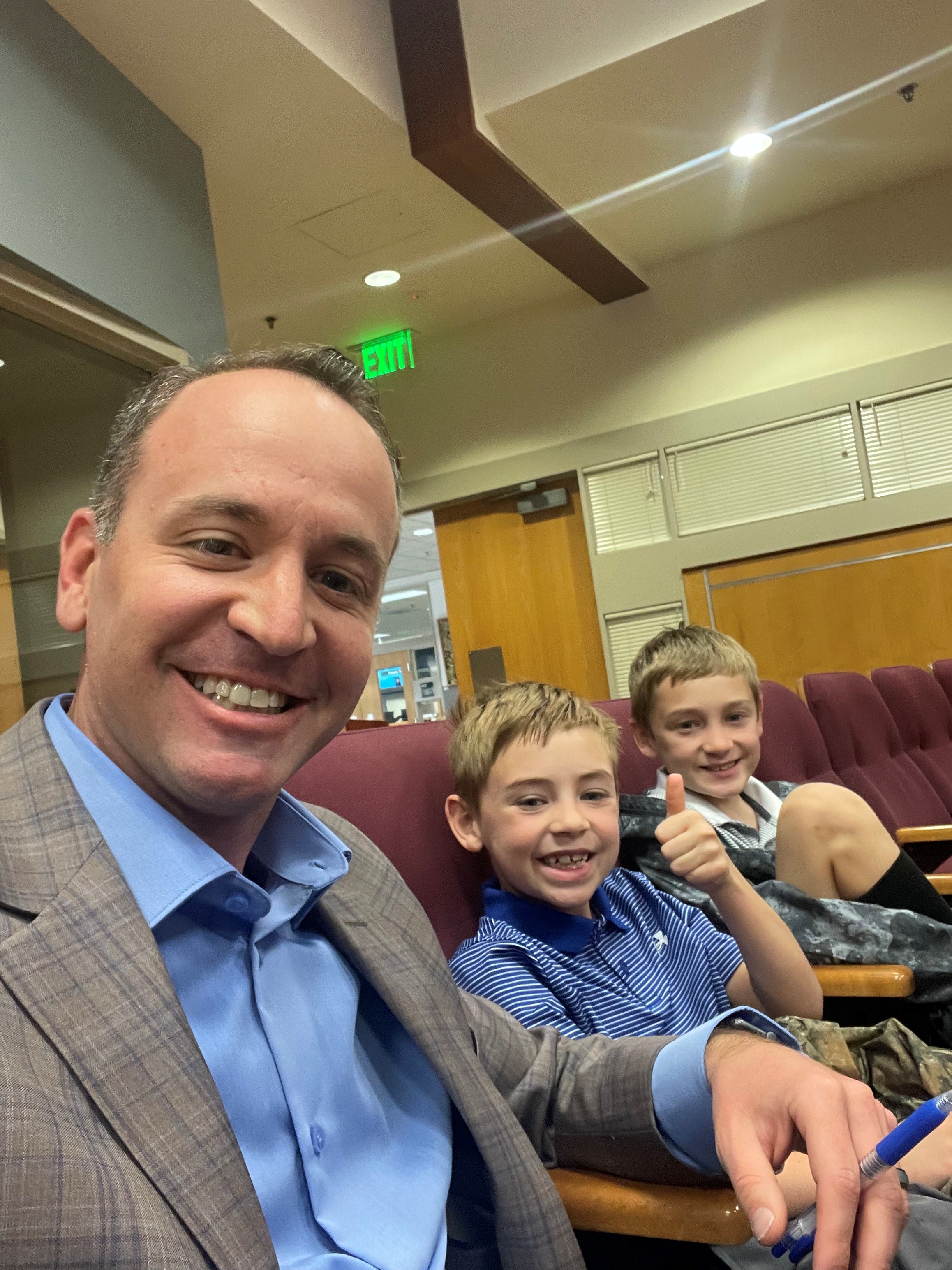Sine Die: LCF's role in public policy advocacy during this past legislative session
Published on May 9, 2024
By Alec Gorynski
Last year, I had the chance to speak with the Lancaster County Board of Commissioners to advocate for funding to support early childhood education in our community. I'd like to think it was my well-reasoned argument that compelled them to vote in support of the appropriation, however, I think these two helped seal the deal.

My boys, Jamie and Ben, were out of school for the day, and my wife and daughter were out of town. I decided they needed a civics lesson, so I told them to put on a nice shirt (I forgot to have them comb their hair), and we headed downtown.
After making my comments and responding to a few questions, one of the commissioners asked who the two young men were. Not missing a beat, I said that my sons had to join me because we didn't have care, and while my job can accommodate this, not everyone's can. For many in our community, care is too expensive or there are not enough slots to support all the working moms and dads in our community.
This was the start of LCF's engagement in public policy advocacy. As a community leader, we recognize that public policy is a tool that can have a profound impact on the prosperity of Lincolnites, and that LCF is in a unique position to serve as an advocate for community priorities which we have been leading for years now. Because of this, last year our board of directors established and seated a public policy advocacy committee to set policy goals and approve positions on legislative bills that align with those goals.
For this most recent legislative session LCF promoted the introduction of, lobbied for, and collaborated with peers from across Lincoln and the state in advocacy for a set of bills would make an impact on our work in the areas of philanthropy, affordable housing, and early childhood education.
Here are how things turned out come sine die:
Affordable Housing
Housing is made affordable because of government and philanthropic investments that allow housing units to be sold or rented for an amount that is affordable for low, moderate, and even middle-income families. The Nebraska Affordable Housing Trust Fund and the Middle-Income Workforce Housing Fund are the two main Nebraska sources of funding, and the focus of the legislature this session.
The Middle-Income Housing Fund supports the construction of owner-occupied homes in urban communities, including Lincoln. Housing developers partner with nonprofit housing agencies to borrow the funds, which permit them to build and sell homes to middle-income families, for whom the traditional "starter home" is currently in low supply.
The legislature approved a $12.5 million appropriation to this program and made some much-needed improvements that will make it more effective for housing development in Lincoln. This outcome was made possible because of a well-coordinated advocacy effort among Lincoln and Omaha housing organizations who were able to argue for a portion of what was originally allocated to a rural housing program.
The Affordable Housing Trust Fund helps pay for a portion of the development of housing projects, including single family homes and multi-family buildings, so that they can in turn be rented or sold to low-income families at an affordable rate. Unlike the Middle-Income program, the Affordable Housing Trust Fund is much more flexible and geared toward developments that will impact low-income families. During this last session, though, the legislature did not advance several bills to increase funding for affordable housing trust fund. We will continue to encourage support for this program in the next session.
The legislature approved a couple of measures to sustain and enhance property valuations and equitable tax treatment of affordable housing, thereby ensuring that the homes can continue to be offered at affordable rates for working, low-income families. One approved measure will help the Lincoln Housing Authority develop new housing using Federal funding programs, a practice which previously would have resulted in an inequitable and burdensome property tax bill.
Another bill preserves and expands valuing affordable housing in order to minimize the property tax bill and keep rents affordable. This practice came under threat following actions by Lancaster County as mentioned in this article. Developers challenged Lancaster County's decision which was argued before the State Supreme Court, and LCF filed an amicus brief arguing that the practice will harm affordable housing plans. The legislature acted swiftly to enshrine this practice and allow for continued affordable housing creation.
Early Childhood Education
The challenges facing the early childhood education system are vast, impacting families and providers alike. Lincoln Littles, a fiscally sponsored organization of LCF, has been working in these areas for years. Their work served as a model or example for several measures introduced this past session to support the childcarle workforce, to make it easier for providers to operate, to provide for the safety of children in the care of a provider, and to offer support for families.
LCF, via Lincoln Littles, worked in collaboration with several organizations including First Five Nebraska to share how the proposed policies could positively impact Lincoln, and the state as a whole.
Notable measures that passed include bills to increase the capacity of childcare providers. Providers are stretched thin, financially, and otherwise, and enhancing their capacity should help open slots so they can serve more families. This includes changes to the subsidy calculation which will result in greater reimbursement rates for providers, who can recoup an amount closer to their actual cost of providing care.p
Another measure will remove certain eligibility requirements for childcare employees and owners to access subsidy for their own children, which will help stabilize the childcare workforce while also ensuring quality care for these kids. Other bills smooth out licensing requirements, and provide for the portability of background checks, so that employees can change childcare jobs without having to wait for another background check.
A final bill worth mentioning is the Governor’s priority bill on early childcare education. The Childcare Capacity Building and Workforce Act was passed, which establishes a matching grant program for childcare capacity, workforce, and family support programs. The work of Lincoln Littles aligns very closely with the identified activities, and due to the generous support of our donors, Lincoln Littles would easily meet the matching requirements.
While there was some ground gained, there was still much that was left on the table for future legislatures to consider. Most notably, a number of the bills that passed did so without the funding necessary to realize their full potential. For example, the Childcare Capacity Building and Workforce Act has no funding available to award any grants, and there were proposed enhancements to the state subsidy program that would allow more families to participate. Additionally, several other bills did not advance out of committee.
Philanthropy
LCF, along with a cohort of community foundations and affiliated funds from across the state, sparked the introduction of the Endow Nebraska Act. If adopted, the Endow Nebraska Act would provide for a state income tax credit for charitable contributions made to endowments held at community foundations.
The rational for this measure is simple: Nebraska is facing a massive generational transition of wealth, and community foundations are in the best position to preserve a portion of the wealth for the long-term benefit of local communities. The bill, as proposed, would have incentivized $200 million in endowment funds at community foundations throughout the state, resulting in an estimated $230 million in community grants over the next 20 years.
The bill had broad support from members in the body, as well as a strong showing of support at the committee hearing, with no opposition. Despite these positives, the bill was not advanced out of the Revenue Committee. LCF and its peers from across the state are prepared to give it another run in 2025.
Public policy advocacy will continue to be a tool for realizing socioeconomic prosperity for all of Lincoln. If you are involved with a nonprofit organization, be it as board member or employee, consider how public policy influences your mission, and if advocacy should be a part of your strategy.
Feel free to contact me to see how we might collaborate, working together for the good of Lincoln.
